
BMC Medical Informatics and Decision Making
Scope & Guideline
Empowering health policy through data-driven insights.
Introduction
Aims and Scopes
- Health Data Analytics:
Research exploring the use of data analytics to improve patient outcomes, including predictive modeling and statistical analysis of health data. - Clinical Decision Support Systems (CDSS):
Studies focused on the design, implementation, and evaluation of systems that aid healthcare professionals in making informed clinical decisions. - Machine Learning Applications in Healthcare:
Investigations into how machine learning techniques can be applied to various health problems, including diagnostics, treatment predictions, and patient management. - User-Centered Design in Health Technology:
Research emphasizing the importance of user experience and usability in the development of health technologies and applications. - Interoperability and Health Information Exchange:
Explorations of systems and frameworks that enable the sharing and integration of health information across different platforms and healthcare settings. - Ethics and Policy in Health Informatics:
Discussion of ethical considerations and policy implications related to the use of technology in healthcare.
Trending and Emerging
- Artificial Intelligence and Machine Learning:
AI and ML applications in healthcare are increasingly prevalent, with studies focusing on predictive analytics, diagnostics, and personalized medicine. - Telemedicine and Remote Monitoring:
The rise of telehealth services and remote patient monitoring solutions has been accelerated by the COVID-19 pandemic, leading to a surge in related research. - Natural Language Processing (NLP) in Healthcare:
NLP applications are expanding, particularly in the analysis of clinical notes and patient-reported outcomes, enhancing data extraction and decision support. - Patient-Centered Care Technologies:
Research emphasizing the design and effectiveness of technologies that support patient engagement and shared decision-making is on the rise. - Data Privacy and Security in Health Informatics:
As health data becomes increasingly digital, concerns around data privacy and security are prompting more research into protective measures and ethical practices.
Declining or Waning
- Traditional Statistical Methods:
There is a noticeable decrease in the publication of studies relying solely on traditional statistical approaches, as the field increasingly shifts towards data-driven machine learning methodologies. - Simple Data Entry and Management Systems:
Research focused on basic data entry systems is waning, with more emphasis now on integrated systems that facilitate advanced analytics and interoperability. - General Health Informatics:
While health informatics remains important, the journal's focus has increasingly narrowed to specialized applications, particularly those involving AI and machine learning, leading to a decline in broader health informatics discussions.
Similar Journals

JAMIA Open
Catalyzing change through accessible health research.JAMIA Open is an open-access journal dedicated to advancing the field of health informatics, published by Oxford University Press. Since its inception in 2018, the journal has provided a platform for novel research, reviews, and case studies that bridge the gap between healthcare and information technology. With an impressive impact factor and a current classification in the Q2 quartile for Health Informatics, JAMIA Open has established itself as a vital resource for researchers and practitioners alike, facilitating the dissemination of innovative findings that contribute to the evolution of healthcare systems. Based in the United States, the journal is committed to providing free and equitable access to high-quality research, thus promoting a collaborative and informed approach to tackling pressing health issues. As it continues to grow and evolve, JAMIA Open remains a cornerstone in the landscape of health informatics, appealing to a diverse audience of researchers, professionals, and students looking to inspire change in their fields.

Healthcare Technology Letters
Advancing healthcare through innovative technology insights.Healthcare Technology Letters is a leading open-access journal published by WILEY that has been at the forefront of disseminating cutting-edge research in the field of health informatics and health information management since its inception in 2014. With an E-ISSN of 2053-3713, this esteemed journal is recognized for its commitment to advancing knowledge and practice in healthcare technology, making it a vital resource for researchers, professionals, and students alike. The journal's scope encompasses a wide range of topics, including digital health solutions, data management, and innovative technologies that enhance patient care. It holds a respectable position in the academic community, featuring a Q3 ranking in both health informatics and health information management as of 2023, and consistently contributing to high-impact research evidenced by its Scopus rankings. By providing open access to its content since 2017, Healthcare Technology Letters ensures that valuable insights and breakthroughs can reach a broader audience, furthering the impact of its published work on the global health landscape.
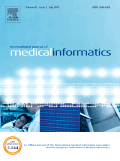
INTERNATIONAL JOURNAL OF MEDICAL INFORMATICS
Elevating Patient Outcomes Through Informatic SolutionsInternational Journal of Medical Informatics, published by Elsevier Ireland Ltd, is a premier peer-reviewed journal dedicated to advancing the field of health informatics. Established in 1997, this journal has consistently strived to disseminate high-quality research and innovative practices, now recognized in the Q1 quartile of health informatics for 2023, ranking impressively at #24 out of 138 in Scopus. The journal's focus encompasses the integration of computer science and information technology in healthcare, fostering discussions on data management, telemedicine, health information systems, and decision support mechanisms. With an ISSN of 1386-5056 and E-ISSN of 1872-8243, it provides options for both subscription and open access, ensuring broad dissemination of research findings. As a vital resource for researchers, professionals, and students in the rapidly evolving domain of medical informatics, the International Journal of Medical Informatics is positioned to be at the forefront of knowledge translation in the health sector, contributing significantly to improvements in patient care and healthcare delivery.

mHealth
Connecting Technology and Health for Better OutcomesmHealth is a pivotal peer-reviewed journal published by AME PUBLISHING COMPANY, focusing on the evolving field of mobile health technologies and their impact on public health and health informatics. With an E-ISSN of 2306-9740, this journal, based in China, operates under an open access model, ensuring widespread dissemination and accessibility of published research. As of 2023, mHealth is recognized in the Q2 category for both Health Informatics and Public Health, Environmental and Occupational Health, reflecting its significant contribution to vital areas of contemporary health research. The journal's Scopus rankings further enhance its reputation, situating it in the 74th percentile for Public Health and 64th for Health Informatics, making it an essential resource for researchers, professionals, and students eager to explore the intersection of technology and health outcomes. Covering a diverse range of topics from 2019 through 2024, mHealth aims to foster innovation and knowledge exchange among practitioners and scholars alike.
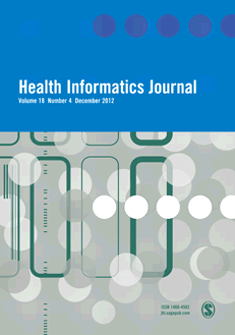
Health Informatics Journal
Unlocking insights at the intersection of health and technology.Health Informatics Journal, published by SAGE Publications Inc., serves as a premier platform for research and discussion in the dynamic field of health informatics since its inception in 1995. With an impressive Q2 ranking in the Health Informatics category and a notable 77th percentile ranking in the Scopus database, this journal provides an essential resource for academics and professionals alike. The journal's transition to Open Access since 2020 has further broadened its reach, ensuring that innovative research is accessible to a global audience. Covering a wide range of topics within health informatics, the journal aims to foster high-quality scholarly communication and facilitate the dissemination of cutting-edge insights that can help advance health care delivery and patient outcomes. With an ongoing commitment to excellence, the Health Informatics Journal is dedicated to enhancing the intersection of technology and healthcare through rigorous research and collaborative exploration.
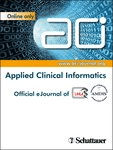
Applied Clinical Informatics
Unlocking the potential of health informatics for improved care.Applied Clinical Informatics is a leading journal dedicated to the expanding field of health informatics and its applications within clinical settings. Published by GEORG THIEME VERLAG KG in Germany, this journal serves as a pivotal platform for researchers and professionals engaged in the integration of technology and healthcare, aiming to improve patient outcomes through innovative informatics solutions. With a solid Q2 ranking in multiple disciplines including Computer Science Applications, Health Informatics, and Health Information Management, it reflects its prominent position in the academic landscape. The journal provides accessible content while fostering dialogue on key issues and advancements in clinical informatics. Covering a wide array of topics from data management to e-health applications, Applied Clinical Informatics is essential reading for those looking to stay attuned to the latest research and developments from 2009 to 2024, enriching the knowledge base of students, professionals, and researchers worldwide.
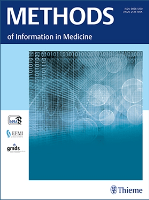
METHODS OF INFORMATION IN MEDICINE
Empowering Medical Professionals with Cutting-Edge Insights.METHODS OF INFORMATION IN MEDICINE, published by Georg Thieme Verlag KG, stands at the forefront of medical knowledge dissemination, pushing the boundaries of Advanced and Specialized Nursing, Health Informatics, and Health Information Management. Established in 1962, this prestigious journal has continuously evolved to address the dynamic landscape of healthcare and information technology, aiming to bridge the gap between clinical practice and innovative information technologies. With a robust impact factor reflected in its 2023 Scopus rankings, where it holds a commendable position in Q1 for Advanced Nursing, it serves as an invaluable resource for researchers, practitioners, and students alike. While it maintains a subscription-based access model, the journal fosters the exchange of pioneering methodologies and transformative ideas that are crucial for advancing healthcare delivery and improving patient outcomes. Explore the latest research, expert insights, and cutting-edge developments that solidify the journal’s role as a leader in the interdisciplinary approach to medicine and information systems.
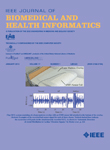
IEEE Journal of Biomedical and Health Informatics
Elevating Healthcare Solutions with Cutting-Edge InsightsIEEE Journal of Biomedical and Health Informatics is a premier publication dedicated to advancing the field of biomedical and health informatics. Published by the esteemed IEEE-Inst Electrical Electronics Engineers Inc, this journal boasts a notable impact within various disciplines, ranking in the top quartile (Q1) across key categories such as Biotechnology, Computer Science Applications, Electrical and Electronic Engineering, Health Informatics, and Health Information Management as of 2023. With a strong Scopus ranking—placing it at #11 in Health Informatics and #6 in Health Information Management—it serves as a vital resource for cutting-edge research and innovative practices. Open Access options enhance accessibility, fostering collaboration among researchers, professionals, and students. Since its inception in 2013, the journal has been committed to publishing high-quality, peer-reviewed articles that explore the pivotal intersection between technology and healthcare, thereby contributing significantly to the evolution of medical practices and patient care.

Health Information Science and Systems
Enhancing health outcomes through informed research.Health Information Science and Systems, published by Springer, stands as a pivotal academic journal advancing the field of health informatics and information science. With its ISSN 2047-2501 and E-ISSN 2047-2501, this open-access journal aims to disseminate cutting-edge research and innovations that bridge the gap between healthcare and information technology. Since its inception in 2013, it has committed to enhancing understanding of health information systems, electronic health records, and data management strategies, impacting both clinical practice and healthcare policy. Researchers, professionals, and students engaged in health informatics will find indispensable insights and studies that pave the way toward improving health outcomes and system efficiencies. The journal provides a global platform for the dissemination of critical analyses and empirical studies up to the year 2024, making it an essential resource for those seeking to stay at the forefront of this rapidly evolving domain.

International Journal of E-Health and Medical Communications
Connecting the dots between technology and patient care.Welcome to the International Journal of E-Health and Medical Communications, a pivotal publication designed to bridge the gap between health informatics and computer science applications. Published by IGI Global, this journal serves as a platform for innovative research and insights into e-health technologies, health communication strategies, and the evolving role of digital tools in enhancing healthcare delivery and management. With an ISSN of 1947-315X and E-ISSN 1947-3168, it caters to an audience keen on advancing the intersection of technology and health, as evidenced by its respectable standings in Scopus rankings—positioned in the 64th percentile in Health Informatics and 63rd in Computer Science Applications. Over its publication history from 2010 to 2024, the journal has consistently contributed to significant discussions and advancements within these fields, highlighted by its Q3 quartile ranking in 2023. Join a community of researchers, professionals, and students dedicated to the ongoing exploration of e-health, as we collectively navigate the complex landscape of healthcare innovation.